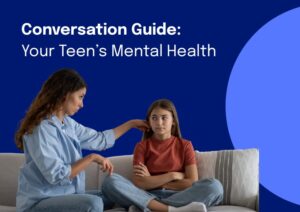Conversation Guide: Your Teen’s Mental Health
 Our partners at JED have developed a conversation guide for when you get the gut feeling that something is wrong with your teen’s mental health.
Our partners at JED have developed a conversation guide for when you get the gut feeling that something is wrong with your teen’s mental health.
This guide is meant to help parents and families who are concerned about their teen’s mental health and emotional well-being have important conversations with their child. Although parents often pick up on concerning signs that their teen is struggling, not everyone feels well-equipped to approach their child to have a conversation about how they are feeling. Knowing what to do after the conversation, especially if the child has expressed something concerning, is not always obvious.
This guide covers the following topics:
- Signs that your teen may be struggling
- Preparing yourself emotionally to have the conversation
- What to say and do during the conversation
- What to do if your teen denies a problem or refuses help but you are still concerned
- How to follow up after the conversation
Although having a conversation when you’re concerned about your teen’s mental health is important, this experience shouldn’t be that different from regular checkins you might have with your teen already. Try not to put too much pressure on this conversation and understand that this is a process and may take multiple conversations to discuss. It’s normal to at some point have some concerns about your teenager’s emotional well-being, so try not to become overly anxious about approaching this topic.


